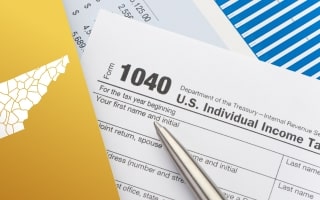Property Tax Records in Tennessee

In Tennessee, homeowners are required to pay property taxes every year. The average property tax rate throughout Tennessee is just 0.56%, which is among the lowest in the country. In comparison, the average property rate across the entire U.S. is 0.99%.
At 1.37%, Shelby County is the only location with an effective tax rate that exceeds 1%. Tennessee property taxes vary with each county. The rate in your county will be applied to your home's assessed value, which is calculated regularly by the assessor in your county. While property taxes in Shelby County are higher than other counties in Tennessee, the effective tax rate is still favorable for homeowners and investors in Tennessee real estate.
You should receive your property tax bill during the first or second week of October. Your taxes are effectively due when you receive the tax bill. However, they'll need to be paid in full by the final day of February. Otherwise, interest will build up and increase the amount you owe.
Property tax laws have been altered considerably over the past two centuries. Before 1834, parcels of land were taxed at a specific amount per acre. It wasn't until 1834 that land was taxed based on its value. Since that time, Tennessee has kept comprehensive records of the property taxes that were paid and who made the payments. Tax lists with owner surnames have been maintained by county governments since the 1870s.
Property Tax Assessment in Tennessee

Property tax assessments are necessary to determine taxes in Tennessee. County assessors are responsible for calculating the value of every property in a specific jurisdiction. Once this assessment is made, property taxes can be estimated.
Depending on the county you live in, assessors revalue properties every four to six years. A revaluation of a property allows the assessor to identify the home's current market value. These values can be appealed if homeowners believe that they have increased by too much. Luckily, it's pretty easy to appeal your property tax assessment in Tennessee.
Keep in mind that property taxes aren't applied to a home's full market value. Instead, they are affixed to the assessed value. For single-family homes, the assessed value equals 25% of the market value. If the home you're interested in buying has a market value of $200,000, the assessed value will be $50,000. The county's tax rate is then applied to this amount.
Tennessee tax rates are set by county commissions. They depend on the amount of funds that local and municipal government bodies need for the year. These rates are often expressed in dollars for every $100 of assessed value. For example, your county may have a mill rate of $4. If your home's assessed value is $50,000, your annual property taxes will amount to $2,000.
You can also calculate your property taxes by multiplying the home's market value of $200,000 by your county's effective tax rate. If the effective tax rate is 0.60%, your annual tax bill will be $1,200. The tax rates for the most populous Tennessee counties are:
- Shelby County: 1.37%
- Davidson County: 0.88%
- Knox County: 0.65%
- Hamilton County: 0.92%
- Rutherford County: 0.68%
If you're looking to save money on real estate taxes in Tennessee, consider buying a house in Davidson County, where Nashville is located.
Calculate Tennessee Taxes
A smart way to understand how property taxes are calculated in Tennessee is to use a Tennessee property tax calculator. This tool simplifies the process for both homeowners and real estate investors by allowing users to enter key property details, such as location, assessed value, property type, and eligibility for exemptions. Because property tax rates in Tennessee are set at the county and municipal levels, the calculator provides a more accurate estimate of your annual tax liability based on your property's exact location and classification.
A Tennessee property tax calculator can also help identify potential exemptions and tax relief programs you may qualify for. Tennessee offers several forms of property tax relief, including the Tax Relief Program for Elderly, Disabled, and Disabled Veteran Homeowners, which provides reimbursements for a portion of the property taxes paid on a qualifying primary residence. There is also a Tax Freeze Program for senior homeowners that can lock in property tax rates if income and age requirements are met. The calculator makes it easier to estimate these savings and get a full picture of your tax responsibilities.
using our property tax calculator.
Tennessee Property Tax Records: What Are They?

The property taxes you pay every year are collected by your county. While each county can use tax revenues to pay for different services, these taxes serve as the primary source of funding for most counties and cities throughout Tennessee. For example, Knoxville uses these funds to pay for most of the city's services and programs, which include everything from building code enforcement and public transportation to fire protection and parks.
If you want to purchase a home in Tennessee but still need to do some research, consider looking up the property's tax records. These records include a considerable amount of info that's freely available to the public. Most counties in Tennessee provide online databases that allow you to search for these records. Some cities offer this info as well. For example, Nashville has an online database that allows you to search by address, owner, or parcel ID. Once you conduct your search, you'll receive the following information:
-
Map and parcel numbers
-
Current owner name
-
Property address
-
Legal description
-
Tax district
-
Tax records
-
Assessment classification
-
Previous sales data
-
Sale price
-
Appraisal year and value
-
Assessed value
-
Property use
-
Square footage
-
Sketch
-
Photo
-
Year built
-
Condition of home
-
Number of bedrooms and bathrooms
-
Comparable property information
-
Special features in the home
-
Improvement details
-
Previous appraisals
Property Tax Exemptions and Deductions in Tennessee

Certain homeowners have access to Tennessee property tax exemptions and deductions that can reduce the annual taxes they owe. The Property Tax Relief Program is available to disabled individuals, seniors, and disabled veterans.
If you qualify for this program, Tennessee will pay for some or all of your property taxes. The amount of tax relief that's available to homeowners is typically announced in the fall every year. Here's a closer look at some of the tax breaks Tennessee homeowners can claim.
Tax Relief for Seniors and Disabled Homeowners: You need to be at least 65 years old to qualify for this form of tax relief. You can also qualify if you're disabled and receive benefits from the Social Security Administration. Every year, your county will set a new household income limit. If you exceed this limit, you won't qualify.
Tax Relief for Disabled Veterans: If you receive a permanent and total disability rating as a result of a service-connected disability, you might qualify for this tax relief. There's no income limit in place for this relief. Keep in mind that the amount of tax relief you receive will change every year based on the county's tax rates.
Senior Tax Freeze: Tennessee allows counties to effectively freeze tax amounts in place for elderly individuals who are at least 65 years old. The household income limit for this tax freeze is $60,000. If you qualify, you can freeze your home as well as five acres of your property. Your home's assessed value will be locked in until you sell the property.
County-Specific Tax Matching Programs: Some counties in Tennessee will match the amount of money that the state pays to qualified applicants. For example, Robertson County provides this program. Once you pay your taxes and apply for the tax relief program, you'll receive a refund check in the mail.
The amount of tax relief changes every year. In 2023, qualified applicants received $139 from the state, which was matched by the county for $278 in total assistance. Disabled veterans were able to receive up to $788 in 2023. Robertson County provided $139 in tax relief for a total of $927 in assistance.
How To Search Property Tax Records in Tennessee

There are a couple of different ways you can obtain Tennessee property tax records, which include county databases and third-party solutions like PropertyChecker. Both sources should provide you with similar data. As mentioned previously, some cities also provide databases that allow you to search for Tennessee property tax records as well as deed information.
If you use a service like PropertyChecker, you can search for a home with different parameters like parcel ID, owner name, and property address. After 15-30 seconds, you'll receive a comprehensive report of property data that includes the following information:
-
Assessed and market values
-
Property owner names
-
Property details, which include lot size, square footage, and number of bedrooms and bathrooms
-
Neighborhood info and crime data
-
Deed records
-
Purchase history
-
Comprehensive loan records
-
Foreclosure details
-
Building permits
-
Lien records
-
Property tax records
How To Appeal Property Taxes in Tennessee

There are several steps you can take to appeal your property tax assessment. If your home's value has increased or decreased, you should receive an Assessment Change Notice in early May. Once you receive this notice, you should have enough time to appeal the valuation before your annual taxes are due. Below is a step-by-step guide on how to appeal property taxes in Tennessee.
Step 1: The first step in the appeals process involves filing an appeal to your County Board of Equalization. If you don't file on time, your home's assessment will become final. Appeals to the Board of Equalization are due within 45 days after you receive your Assessment Change Notice.
Appeal forms can be mailed or submitted online. You'll receive a notification that tells you when a hearing will take place. During this hearing, you'll be able to present evidence that supports your argument.
Step 2: If you don't agree with the County Board's decision, you can file an appeal with the State Board of Equalization. Make sure you appeal within 30 days after receiving the initial decision and order from the County Board. Keep in mind that an appeal by the State Board of Equalization isn't guaranteed.
Step 3: If the State Board of Equalization doesn't grant your appeal, you can request a judicial review of the Board's final action. You'll need to file a petition in your county within 60 days after the State Board makes its decision.
How Property Tax Records Impact Real Estate Transactions in Tennessee

Property taxes can factor into every real estate transaction. When a buyer wants to purchase a home, they'll be tasked with calculating their annual property taxes to determine how high their monthly mortgage payments will be.
If a buyer is considering a $300,000 home in a county with a 1% effective tax rate, they might be looking at a tax bill that amounts to $3,000 per year. In this scenario, their monthly mortgage payments will increase by $250.
The buyer's budget might not support this increase, which means that they would likely need to search for a more affordable home. Sellers must account for this type of situation as well. Homeowners who live in counties with high property taxes will need to price their homes appropriately to ensure they receive offers.
Buyers and investors alike can use property tax records to research homes before making offers on them. You can learn about a property's condition, age, and features with these records. A home's recent tax bills should also be listed in these documents, which makes it possible for investors to estimate the profitability of a rental home. Since Tennessee has low property taxes, it's easier for investors to earn profits on the properties they buy.
Investors in Tennessee have the opportunity to buy properties if taxes haven't been paid by the owners. If you own a Tennessee home, your property taxes will become delinquent following the final day of February. On March 1, penalties and interest will begin to accrue at a rate of 1.5% per month, which means that the total amount of unpaid taxes increases by 18% each year.
When Tennessee property taxes become delinquent, the county government can choose to sell the home in a tax sale. The purpose of this sale is to allow the government to reclaim the outstanding taxes that the homeowner owes. Unlike some states, tax lien certificates aren't sold to investors.
The investor who makes the winning bid in a tax sale doesn't gain full ownership of the property immediately. In most cases, the existing homeowner will have a redemption period, during which they can repay the taxes they owe to maintain ownership of their property. If done right, one can find some steals when it comes to buying tax sale homes in Tennessee.
The redemption period in most Tennessee counties is one year. If the taxes have been delinquent for anywhere from five to eight years, the redemption period will only be six months. This period is reduced to 90 days for taxes that have been delinquent for more than eight years. If the property is abandoned or vacant, the redemption period will only be 30 days.
Free Tennessee Property Tax Lookup
Tax Records Please wait...
Property Tax Guide
- Property Tax Records in Tennessee
- Property Tax Assessment in Tennessee
- Tennessee Property Tax Records: What Are They?
- Property Tax Exemptions and Deductions in Tennessee
- How To Search Property Tax Records in Tennessee
- How To Appeal Property Taxes in Tennessee
- How Property Tax Records Impact Real Estate Transactions in Tennessee
Instant Access to Tennessee Property Records
- Owner(s)
- Deed Records
- Loans & Liens
- Values
- Taxes
- Building Permits
- Purchase History
- Property Details
- And More!
Free Tennessee Property Tax Lookup
Tax Records Please wait...
Property Tax Guide
- Property Tax Records in Tennessee
- Property Tax Assessment in Tennessee
- Tennessee Property Tax Records: What Are They?
- Property Tax Exemptions and Deductions in Tennessee
- How To Search Property Tax Records in Tennessee
- How To Appeal Property Taxes in Tennessee
- How Property Tax Records Impact Real Estate Transactions in Tennessee